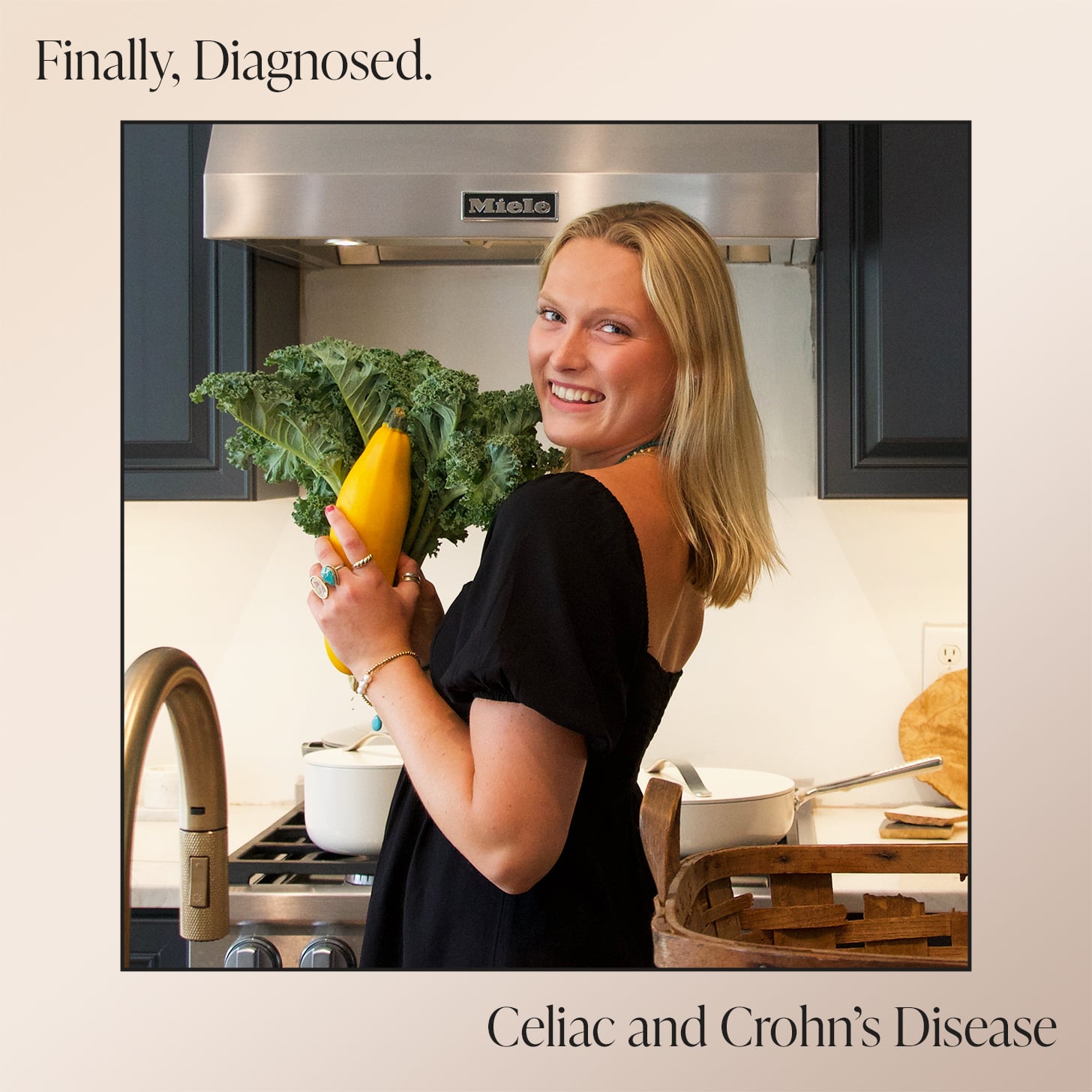
Lauren Murawski, 23, was a freshman in college when she began to experience digestive problems. “After I would eat, I would start to ‘baby barf,'” she tells POPSUGAR, explaining that she’d essentially burp up her food. It happened so often that her friends starting calling her “the burpologist.”
At first, the GI issues weren’t a red flag to Lauren; she just thought they were a sign of the stress she was under at the time. “I was having a bit of a difficult time with the adjustment with school and was going through my first breakup,” she says.
But then, her GI symptoms got worse. She began experiencing severe stomach aches, and the baby barfing turned into projectile vomiting. She also started to lose weight inexplicably.
Knowing she needed to get help with her health, Lauren decided to leave her Massachusetts college and enroll in school back home in upstate New York to be closer to her support system. Once she was back home, her dad, a nurse, scheduled a gastroenterologist appointment for her, and she underwent a series of blood tests.
In January 2018, Lauren was diagnosed with celiac disease.
At first, Lauren says she felt relieved by the diagnosis of celiac, which is an immune reaction to eating gluten and can cause diarrhea, bloating, nausea, and vomiting, among other symptoms, according to the Mayo Clinic. “I was like, ‘Yay, I finally have my answer.’ Now, all I have to do is eat gluten-free and I’m going to feel better,” she says.
Unfortunately, this turned out to be only the beginning of what Lauren calls the “worst journey” of her life.
Despite changing her diet and doing everything to avoid gluten and cross contamination, “my symptoms kept getting worse and worse and worse,” Lauren says. Her bloating was so bad that she appeared pregnant, and “one day, I vomited 17 times in a row,” she tells POPSUGAR. She was also having eight to 12 bowel movements a day, which she knew was abnormal.
She went back to to her gastroenterologist, and the office ran several tests to see what the problem might be. “I went through weeks of just going to the hospital, going to the doctor’s — and at the time, I’m in college, so I’m not really having the college experience that I was looking to have,” Lauren says. But even more disappointing was that after all of the testing, Lauren was told that the results showed nothing new.
But Lauren refused to accept that everything was fine. “I was like, ‘What the heck is happening here?'” Fortunately, her doctor decided to do one more test: a colonoscopy. That found inflammation in her small bowel, a potential sign of Crohn’s disease.
The results were borderline — there was some inflammation; not enough to give a definitive diagnosis of Crohn’s, but too much to definitely be a result of celiac alone. “They told me that I was a very difficult case,” Lauren remembers.
Her healthcare practitioner suggested putting Lauren on steroids to see if her symptoms would subside, and her quality of life was suffering so much that that she was willing to give them a try. When they didn’t work, Lauren underwent another colonoscopy. This time, she got an official Crohn’s diagnosis, and her doctors suggested a stronger course of treatment.
Lauren started getting infusion treatments for Crohn’s disease in March 2019.
“They put me on Remicade, which is an infusion drug . . . I would go to the hospital, they would put an IV in my arm, and I would sit there for three hours every three months,” Lauren says. But even with the new medication, she struggled to find relief.
“I kept telling my doctor, ‘I swear, I feel like I’m going crazy — nothing is working, and I feel more sick,'” Lauren says. But Lauren says her concerns were dismissed. Her care team kept telling her, “This should be working.” “I just felt like nobody cared,” Lauren says.
At that point, she decided it was time to get a different opinion. Lauren spent the next three years seeking the help of several different experts, from doctors to dietitians, and collecting new diagnoses along the way: small intestinal bacterial overgrowth (SIBO); E.coli; irritable bowel syndrome. She was also undiagnosed, then re-diagnosed, with Crohn’s, and eventually taken off Remicade.
The healthcare practitioners she saw often tried various new treatments to address her symptoms. Some were helpful — an antidepressant she was put on helped ease her bloating to a degree, she says — while others were not.
A restrictive eating plan her dietitian put her on, for instance, led to Lauren developing an eating disorder. While elimination diets can be helpful for some people with GI diagnoses to identify the foods that trigger their symptoms, the method didn’t work for Lauren, who says it harmed her relationship with eating in general. The dietitian placed “toxicity on certain food groups,” like fruit, she says. Lauren recalls standing at her blender for 15 minutes just crying over the fruit she’d put in it and how it might interact with her body.
“I was so scared to eat. When I didn’t eat, I felt really good. So I was like, ‘Well, if I don’t eat, then I’m not gonna have symptoms, and then there’s nothing to worry about,'” Lauren says. “No one should have to think about eating food like that and be so scared of what’s going to happen.”
Finally, Lauren decided to take her health into her own hands.
After all of the different healthcare practitioners and treatments, Lauren was still dealing with gut inflammation, throwing up, and frequent bowel movements. So in April 2022, over four years after she was first diagnosed with celiac, she went back to her gastroenterologist and was met with disappointing news: one, that he had run out of options and two, that he believed these symptoms would probably be something she’d have to deal with for the rest of her life.
Lauren couldn’t accept that there were no other options for her. After leaving the appointment, she started doing her own research and looking into holistic remedies that might help.
The first thing she changed was her exercise routine. Lauren used to do HIIT workouts and cardio several times a week, hoping to offset the bloating she often experienced. But she learned through online forums and anecdotal evidence that high-intensity workouts can potentially contribute to inflammation, abdominal pain, and diarrhea in IBS patients. “I used to sabotage my body because I was like, ‘I’m feeling bloated, that means I need run more and do more cardio,'” she says. “But in reality, my body just need to rest and be able to heal.”
So she began prioritizing exercise associated with stress reduction — namely, yoga. “I started going to hot yoga like four to five times a week,” she says. Research has shown that yoga can improve IBS symptoms both mental and physical, reducing symptom severity as well as psychological side effects like stress and anxiety.
Lauren also got honest with herself about her eating disorder, researching ways to restore her love of food: “If I didn’t acknowledge that I was scared of food to myself, then I wouldn’t have been able to take the first step to even try to heal from it.”
Little by little, Lauren started reintroducing her favorite foods back into her life. “For me, it was choosing a food every week, and challenging myself to eat it,” she explains. She started with small portions, just enough to help her assess whether the food was going to trigger her symptoms, and she journaled what she ate so she could better spot patterns (something her doctors had never suggested she do, surprisingly). While she eventually overcame the fear that every food was going to upset her stomach, it wasn’t easy — and looking back, Lauren says she wishes she’d sought professional support to help her manage the process.
After about four months, Lauren was able to figure out some of her top trigger foods, including carbs, garlic, onion, and natural sugars. “So I couldn’t have large amounts of fruit,” Lauren says — but she didn’t have to cut it out entirely either. She also prioritized more gut-friendly foods and ingredients (peppermint tea became a go-to reliever), as well as an overall whole-food diet.
Six months after that, she noticed a significant reduction in her symptoms, and within a year, Lauren felt like she finally had her GI issues under control. She was still getting regular blood tests for her celiac disease, but had stopped taking other medications. And in learning to listen to her own body for cues rather than relying strictly on medicine, she says that she has been able to put her Crohn’s disease and IBS in remission. Ultimately, Lauren and her doctors agreed that she had Crohn’s disease, celiac, and IBS — but so far, restorative exercise and avoiding her trigger foods by sticking to a non-inflammatory, whole food diet has helped her stay in remission for over a year. Using functional medicine techniques to address irritable bowel diseases, like Crohn’s disease is not all that uncommon, either. In fact, research has shown that functional medicine (e.g. making adjustments to lifestyle, environment, relationships, sleep, stress, and nutrition) can positively contribute to high-quality, personalized IBD care that results in improved health and optimized function for some people. The same can be said for using a more integrated approach to managing IBS, as research has also shown that removing irritating foods, improving overall nutrition, and prioritizing stress reduction can help reduce IBS flare-ups and reduce symptom severity.
While Lauren’s diagnosis journey has come to end, she never forgot how alone and abandoned she felt throughout the process, sparking her decision to create online and in-person resources for others. Now, Lauren is focusing on fostering a community for those searching for answers and trying to manage the same conditions, posting her experiences on social media and hosting in-person meet-ups. In fact, advocacy and raising awareness has become her full-time job. “I was able to quit my 9 to 5 and do this full time and I just love it so much,” Lauren says. “It’s a very rewarding position to be in.”
Image Sources: Will Schaefer and Photo Illustration by Aly Lim
